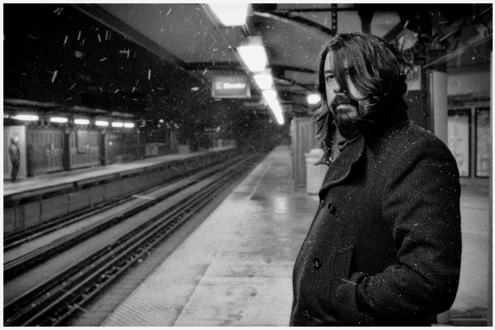Music to his ears: HBO's Sonic Highways indulges Foo Fighters frontman Dave Grohl
10/15/14 09:26 AM

Premiering: Friday, Oct. 17th at 10 p.m. (central) on HBO
Starring: Foo Fighters frontman Dave Grohl, his bandmates and various musicians/producers
Directed and co-produced by: Dave Grohl
By ED BARK
@unclebarkycom on Twitter
Dave Grohl means well, even if his Foo Fighters: Sonic Highways series doesn’t always hit the right musical chords.
Each hour of the 8-episode series “is devoted to a different American musical landmark, chronicling the history, cultural environment and people that define each city’s unique musical identity,” according to HBO publicity materials.
First up Friday night is Chicago, presumably defined above all by the blues. Grohl, who directed each episode, indeed spends some time with Buddy Guy, the Muddy Waters disciple whose guitar ferociously tore into the blues.
“His playing is so intense that it sounds mean,” says Jimmie Vaughan.
But Cheap Trick and the ‘80s punk band Naked Raygun get equal exposure while Chicago (the band) gets hardly any time at all.
Choices must be made here, and you can’t include everyone. But this opening chapter of Sonic Highways pretty much is funneled through the words of Foo Fighters drummer Taylor Hawkins, who says, “I don’t care about the blues really. When I think of Chicago, I think of Cheap Trick. That’s about as deep as I go.” This strikes him as funny.
Grohl also devotes ample time to producer Steve Albini, veteran proprietor of the Electrical Audio recording studio, former peripheral member of Naked Raygun and known in the industry for being a “cynical prick.” Albini also produced and recorded Nirvana’s third album, “In Utero,” back when Grohl was the band’s drummer.
None of this is boring. Who knew, for instance, that the famed Cubby Bear sports bar, located in the heart of Wrigleyville, used to be a weeknight mecca for the punk scene? As a wide-eyed kid, Grohl was taken there by his very grownup cousin, Tracey Bradford, with whom he reconnects in Sonic Highways. “It just turned my world upside down,” he tells her. She was a punk performer herself, with Verboten.
In each of the 10 cities they visited, Foo Fighters recorded a song for their new album at a “legendary studio integral to the unique history and character of each of these great musical capitals.” In Chicago, they pound through “Something From Nothing,” with Cheap Trick guitarist Rick Nielsen sitting in. This decidedly isn’t the blues. And Buddy Guy is nowhere to be seen.
Episode 2, also made available for review, originates from Washington, D.C. Grohl grew up in a Virginia suburb, and the Inner Ear Studio “produced the entire soundtrack of my youth,” he recalls.
Again, that would be punk, with former members of Bad Brains and Teen Idles getting most of Grohl’s attention along with Inner Ear Studio owner Don Zientara.
“Go-Go” music also gets into the mix, with an emphasis on this funk genre’s founding father, the late Chuck Brown. But Grohl’s go-to guy is veteran local punk potentate Ian MacKaye, whom he idolized growing up.
The Foo Fighters put on a D.C. club show with both punksters and funksters during this second hour of Sonic Highways. Alas, all viewers will get is Grohl’s tease of a long night of heavy duty rock. Then it’s immediately on to the Inner Ear Studio for a closing performance of “The Feast and the Famine,” which also will be on a new Foo Fighters album scheduled to be released on November 10th.
Sonic Highways’ other stops will be in Nashville, New Orleans, New York, Los Angeles, Seattle and Austin, where Grohl hooks up with Gibby Haynes, co-founder of Butthole Surfers and son of the late, legendary Dallas children’s TV host Jerry “Mr. Peppermint” Haynes.
Open questions: will Sonic Highways at least emphasize jazz in New Orleans and country in Nashville? And might the Foo Fighters stray from their comfort zone to record a song in each vein?
Whatever happens, this is an interesting series and a worthy endeavor that makes terrific use of archival footage in both of the first two hours. But the overall emphasis on punk is at the expense of more vital genres. Nowhere more so than in Chicago, where Buddy Guy and other bluesmen aren’t exactly left out in the cold but too often hit the cutting room floor.
GRADE: B
Email comments or questions to: unclebarky@verizon.net
